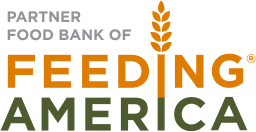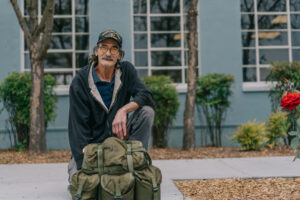Why We Keep Feeding the Ducks
Some say of food assistance, “don’t feed the ducks or more will come.” With 30-40% of food going to waste in America, there is more than enough to go around
By Emily Gallion, Grant & Metrics Manager/Advocacy Manager, and Caitlyn McIntosh, SNAP/Outreach Lead
There is a comment we are tired of hearing: “There are a lot of nice cars in your line today.”
On days our Drive Thru Food Pantry is open, a line of cars stretches down the block. Some of these cars are a bit battered, a bit older — this is what somebody might assume the car of a hungry person “should” look like. Some are not.
When people make these comments to us, we remind them that there are a lot of very plausible reasons for a “nice” car to be in our line. Sometimes people pick up food on behalf of friends, families, and neighbors who do not have transportation or are house-bound. Some of our clients borrow cars to get to a food distribution. Some healthcare or social workers pick up food for the people they serve.
Sometimes, one unexpected job loss, sudden health emergency, or natural disaster is all it takes for a family that looks financially stable to need extra help.
But there is another reason we do not spend our time worrying who is in our lines. At The Foodbank, we do not believe that food is a scarce commodity that should be jealously hoarded. There is more than enough to go around. Our job is simply to close the loop in a food system that does not always fairly allocate its resources to those with lower incomes.
Food (Waste) for Thought
According to the US Department of Agriculture, 30-40% of food produced in the US goes to waste. That amounts to about 133 billion pounds of food each year, or 111 billion meals. For context, Feeding America has estimated that the total number of people experiencing food insecurity in the wake of the pandemic is just over 50 million.
As foodbankers, our job is to coordinate the movement of this food from where it is not needed to our 116 partner agencies and our direct service programs, such as the Drive Thru.
To be clear, we do not simply throw food into anyone’s trunk. All clients at our programs and partner agencies must have an income at or below 200% the federal poverty limit (230% during COVID). We track recipients of our food in our client management system, PantryTrak, and report aggregate data to key stakeholders, such as the Ohio Department of Jobs and Family Services.
(While clients must meet income guidelines to receive federal food, we do not turn people away. If somebody is at risk of going hungry and does not meet the income guidelines, we are able to give them food as long as it does not include federal and state-purchased food.)
Although we do purchase some food each year, a large portion of the food we distribute is food rescue product we pick up at the back docks of retailers. Otherwise, this food would likely go to waste.
Even the federally purchased food we receive, which must be distributed according to certain guidelines, is often a consequence of our food system. For example, food purchased through The Emergency Food Assistance Program (TEFAP) has included trade mitigation purchases to offset lost sales to China. These programs provide stimulus to farmers while redirecting much-needed food to American households.
In short, food insecurity is not caused by a lack of food in the United States. Food insecurity is really a symptom of a larger problem, which is structural poverty and inequality.
Building an Abundance Mentality
So why are we committed to shifting to a mentality of abundance instead of scarcity? Indeed, many nonprofits fall into this trap of fear-focused messaging because it makes for more compelling fundraising. However, we know that approaching our work with a mindset of scarcity is bad for the people in our lines.
While we know that we will not run out of food, we understand that fear can put those thoughts into the minds of people in crisis, especially for those who are receiving food assistance for the first time. Seeing a long line of cars a mile down the road might make people worry there won’t be enough for someone at the back of the line — we assure you there is no need to worry.
In all fairness, the COVID-19 pandemic has created an unprecedented set of circumstances. At the end of March, we began to worry about the food supply in our warehouse. As supplies in grocery stores began to dwindle across the country, we wondered what that would mean for our ability to procure food.
In April, we had to place a 30 day service limit on visits to our Drive Thru, something we have never had to do before. Thankfully, by May we were able to lift that service limit and take a deep breath as food sourcing was no longer an issue. We have a slogan here at The Foodbank: “We’ll figure it out.” And we always do.
It is important to note that while we are not constrained by the overall supply of food, our ability to meet the need in our community is dependent on our financial reserves and physical capacity. During the pandemic, we have had to purchase more food and equipment than previous years. Donations are as critical as ever to allow us to keep serving families who need us.
We distributed over 18 million pounds of food last year, and we couldn’t have done it without the backing of our community.
At the end of the day, our job is to continue serving our clients without judgment. It is not up to us to decide how they got to us, as we know hunger does not operate in a silo.
The people in our lines include the single mom who lives next door to you and was already barely making ends meet before the pandemic. It is the elderly man down the street who does not have any family to help him. It is the person who looks like you who is experiencing a financial emergency.
People have told us, “don’t feed the ducks or more will come.”
We say, send the ducks to us. We have plenty of duck food.





No comment yet, add your voice below!